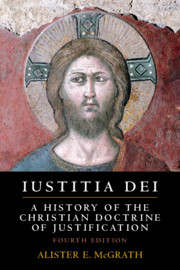Book contents
- Iustitia Dei
- Iustitia Dei
- Copyright page
- Contents
- Tables
- Preface to the Fourth Edition
- Abbreviations
- Introduction
- Part I Justification
- Part II The Middle Ages
- 4 The Nature of Justification
- 5 The Righteousness of God
- 6 The Concept of Grace
- 7 The Human Appropriation of Justification
- 8 Justification and the Two Powers of God
- 9 The Concept of Merit
- 10 Justification and the Sacraments
- Part III Protestantism
- Part IV Catholicism
- Part V The Modern Period
- Conclusion
- A Brief Glossary of Medieval Soteriological Terms
- Works Consulted
- Index
10 - Justification and the Sacraments
from Part II - The Middle Ages
Published online by Cambridge University Press: 27 January 2020
- Iustitia Dei
- Iustitia Dei
- Copyright page
- Contents
- Tables
- Preface to the Fourth Edition
- Abbreviations
- Introduction
- Part I Justification
- Part II The Middle Ages
- 4 The Nature of Justification
- 5 The Righteousness of God
- 6 The Concept of Grace
- 7 The Human Appropriation of Justification
- 8 Justification and the Two Powers of God
- 9 The Concept of Merit
- 10 Justification and the Sacraments
- Part III Protestantism
- Part IV Catholicism
- Part V The Modern Period
- Conclusion
- A Brief Glossary of Medieval Soteriological Terms
- Works Consulted
- Index
Summary
During the Middle Ages, the justification of humanity increasingly came to be linked with an explicitly sacramental economy of salvation, with a particular emphasis upon the sacramenta mortuorum (baptism and penance) as the divinely ordained means of establishing and restoring justification. This chapter considers this development, which forged an increasingly robust link between the practice of justification and the institution of the church. Although the possibility of extra-sacramental justification was recognised, the normative account of the initiation and restoration of justification was now firmly linked with the sacramental ministry of the church. This chapter explores the development of this move, and considers its implications. In closing, it turns to deal with some trends in Renaissance biblical scholarship which opened up new and important questions in relation to the theory and practice of justification, such as the revision of the accepted words of Christ on beginning his ministry from ‘Do penance, for the kingdom of God is at hand’ to ‘Repent, for the kingdom of God is at hand’.
- Type
- Chapter
- Information
- Iustitia DeiA History of the Christian Doctrine of Justification, pp. 169 - 182Publisher: Cambridge University PressPrint publication year: 2020

